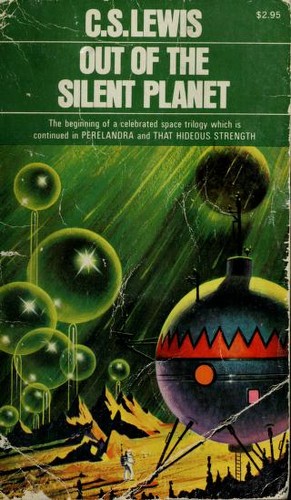Stephen Hayes reviewed Out of the Silent Planet by C. S. Lewis
None
5 stars
I've read this book at least four times, and probably more, and when a friend who had just read it for the first time posted a review, I realised that I hadn't yet done so, and that after having read it so many times, any review that I posted would probably contain spoilers, and so I should mark it as such.
The book is usually described as science fiction, and Lewis himself intended it to be science fiction, but it is closer to fantasy than science fiction. And even more, it is social satire along the lines of [b:Gulliver's Travels|7733|Gulliver's Travels|Jonathan Swift|https://images.gr-assets.com/books/1427829692s/7733.jpg|2394716]. [a:Jonathan Swift|1831|Jonathan Swift|https://images.gr-assets.com/authors/1183238507p2/1831.jpg] wrote at a time when most people in the British Isles knew less about earth than Lewis's generation knew about the solar system, so he could people far-away lands with strange people and societies to his heart's content. Lewis, writing in the 20th century, had to move the scene to another planet.
The state of geographical knowledge was not his only reason for doing so. He had a theological reason as well -- he saw earth as being behind a kind of cosmic iron curtain, sealed off and in quarantine from the rest of the universe, ruled by an insane planetary dictator, a bit like Enver Hoxha's Albania. Earth was the silent planet.
Quite often people ask questions about what effect the discovery of intelligent life on other planets and encounters with alien species from outer space would have on "religion". There is usually the implication that the alien species would be a threat. If those who ask such questions were to read C.S. Lewis they would see that he had anticipated their questions by several decades, and turned the answer around. The danger is not from outer space, threatening earth, but earth is the threat, bottled up behind the sanitary cordon of the moon's orbit. The danger to the universe comes out of the silent planet, not into it.
Lewis is an academic, and his social satire is primarily academic. Even today, people argue about education. Should education be STEM (Science, Technology, Engineering and Mathematics)? Weston, the chief villain of Out of the Silent Planet clearly seemed to think so, and had no time for the humanities, represented by Ransom, the philologist. These two branches of academia were fighting over funding and resources, and are still doing so today. And what about vocational training? People feel they need a university degree, and being a plumber or an electrician or a mechanic is regarded by many as not good enough.
As Swift with his society of Houyhnhnms shows something better than human society, so Lewis shows three kinds of intelligent beings living together in harmony and seeing their skills as complementary rather than in competition -- the Hrossa (poets), the Sorns (scientists) and Pfifltriggi (artisans) see each other, not as rivals, but as collaborators. Human beings in the silent planet are divided by race and class. It is apparent even in the opening scenes that Ransom is torn between his own professional and class links with Weston and Devine, and his exasperation yet sympathy with Harry and his mother.
The difference is that Ransom learns from his experience on Malacandra, while Weston and Devine do not. While human beings may differ in race, class and culture, they all belong to the same species, so should find it easier to get on than the three "races" of Malacandra, which differ far more in physical appearance, They are not simply different races, as human beings are, but they are different species. Nevertheless, they live in harmony, without conflict. That is Lewis's answer to the question of how we should regard space aliens, and also to differences of "race" and class on earth.
The social satire deepens towards the end, when Lewis tackles imperialism and colonialism, trying to translate Weston's speech to a being that has no comprehension of human sin. Lewis was clearly aware that anthropology as an academic discipline was introduced to serve the needs of European colonialism, and Weston's assumptions and explanations fit this mould. Dick Devine fits the mould of Cecil Rhodes, and could almost, but not quite, be taken as an allegory of Rhodes.
None of this was apparent to me on my first reading of the book. I was vaguely aware of some of the theological implications, but it took quite a lot of study of history and other literature to see the full implications of what Lewis was saying. Science fiction, in the sense of interplanetary travel, yes. But the book is even more fantasy and social satire, showing in an exaggerated way the social situation on earth.

